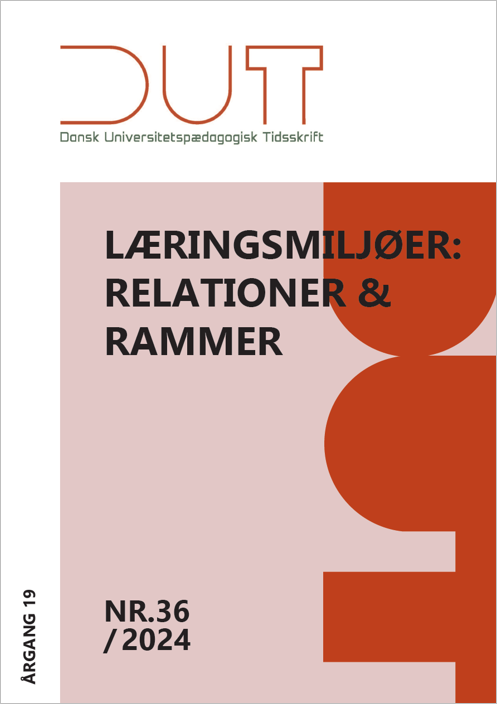Operationelle læringsmål: Revision med studenterinddragelse
DOI:
https://doi.org/10.7146/dut.v19i36.140195Resumé
Abstract
Vi præsenterer et udviklingsprojekt, hvor underviserne på Bioanalytikeruddannelsen på Københavns Professionshøjskole har lavet en fælles revision af alle uddannelsens læringsmål. Formålet var at fremme de studerendes forståelse af målene og dermed understøtte aktivt brug, hvorfor revisionsarbejdet bl.a. bygger på input fra de studerende i form af en survey inden arbejdet blev igangsat samt feedback på pilotudgaver af de reviderede målformuleringer. Udviklingsarbejdet blev udført i et samarbejde mellem alle undervisere i arbejdsgrupper for hvert semester og med peer feedback mellem semestrene på udkast til målbeskrivelser. Resultatet var:
- Færre læringsmål med tydelig adskillelse mellem mål og indhold
- Et standardiseret format via fælles skabelon for målbeskrivelser for alle semestre
- Tydeligere og for de studerende mere forståelige formuleringer: Mere brugervenligt og ensartet sprog mellem semestre
Et kort og præcist format, der fokuserer på, hvad de studerende skal kunne med kursets/semestrets faglige indhold
Referencer
Bekendtgørelse 771 (2023). https://www.retsinformation.dk/eli/lta/2023/771
Biggs, J.B., C Tang, G. Kennedy (2022). Teaching for Quality Learning at University. 5 udg., 1. udg. 1999. Maidenhead, Open University Press.
Bloom, B. S. (1956). Taxonomy of educational objectives: Cognitive and affective domains. New York: David McKay.
Brooks, S., Dobbins, K., Scott, J.J.A., Rawlinson, M. & Norman, R. I. (2014). Learning about learning outcomes: the student perspective, Teaching in Higher Education, 19 (6), 721-733. https://doi.org/10.1080/13562517.2014.901964
Clausen, T. & Hvass, H. (2018). Hvad lærer de studerende, at de skal lære? en undersøgelse af kandidatstuderendes opfattelse og brug af læringsmål, Dansk Universitetspædagogisk Tidsskrift, 13(24), 5-19. https://doi.org/10.7146/dut.v13i24.96686
Christiansen, F. V., Horst, S., & Rump, C. Ø. (2013). Kursusbeskrivelser I: Rienecker L., Jørgensen P. S., Dolin, J., Ingerslev G. H. Universitetspædagogik. Frederiksberg: Samfundslitteratur, 133-143.
Lodder; N. & Meijers, F. (2017). Collective learning, transformational leadership and new forms of careers guidance in universities. British journal of guidance & counselling, 45(5), 532-546. https://doi.org/10.1080/03069885.2016.1271864
Erikson, M.G. & Erikson, M. (2019). Learning outcomes and critical thinking - good intentions in conflict. Studies in Higher Education, 44(12), 2293-2303. https://doi.org/10.1080/03075079.2018.1486813
Schoepp, K. (2019). The state of course learning outcomes at leading universities. Studies in Higher Education, 44(4), 615-627. https://doi.org/10.1080/03075079.2017.1392500
Olin, S.J., Springer, C. & Royal, K. (2022). Veterinary Students' Use of Learning Objectives, Journal of Veterinary Medical Education, 49(6), 751-758. https://doi.org/10.3138/jvme-2021-0023
Sin, C. (2014). Lost in translation: the meaning of learning outcomes across national and institutional policy contexts. Studies in Higher Education, 39(10), 1823-1837. https://doi.org/10.1080/03075079.2013.806463
Thomasen, I.N., Lorenzen, H. & Johnsen, S. (2019). Gruppebaserede læringsrum - rummer de læring? Studerendes oplevelser af tre forskellige læringsrum, Dansk Universitetspædagogisk Tidsskrift 14(27), 155-176. https://doi.org/10.7146/dut.v14i27.112641
Downloads
Publiceret
Citation/Eksport
Nummer
Sektion
Licens
DUT udkommer elektronisk via Statsbibliotekets Open Journal System (Tidsskrift.dk) og DUNs hjemmeside (DUN-net.dk) forår og efterår. Det er gratis og frit tilgængeligt at læse og downloade artikler fra tidsskriftet.
Det er ikke muligt at abonnere på Dansk Universitetspædagogisk Tidsskrift, DUT, men hvis du er medlem af DUN, får du tilsendt en nyhedsmail med link til udgivelsen, når den nyeste udgave er online. Linket vil også være tilgængeligt her på siden, så snart tidsskriftet er publiceret.
© Copyright
Artikler publiseret i Dansk Universitetspædagogisk Tidsskrift, DUT, må bruges (downloades) og genbruges (distribueres, kopieres, citeres) til ikke-kommercielle formål med reference til forfattere og Dansk Universitetspædagogisk Tidsskrift.
Artikler indsendt til Dansk Universitetspædagogisk Tidsskrift må ikke publiseres i andre tidskrifter.
Betingelser
Artikler i Dansk Universitetspædagogisk Tidsskrift, DUT, er omfattet af ophavsretsloven, og der må citeres fra dem.
Følgende betingelser skal dog være opfyldt:
- Citatet skal være i overensstemmelse med „god skik“
- Der må kun citeres „i det omfang, som betinges af formålet“
- Ophavsmanden til teksten skal krediteres, og kilden skal angives ift. ovenstående bibliografiske oplysninger.





